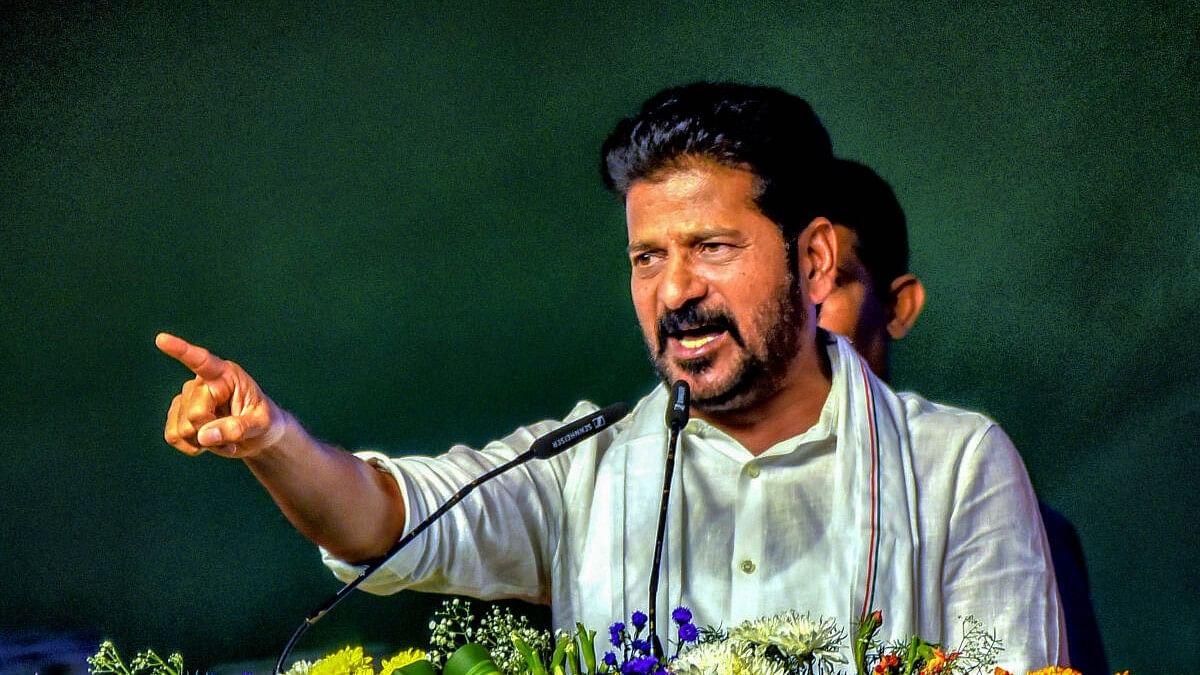
Telangana Chief Minister A Revanth Reddy.
Credit: PTI Photo
Local self-governance (LSG) forms the bedrock of democratic administration, designed to ensure governance that is participatory, inclusive, and reflective of grassroots aspirations. The 73rd and 74th Constitutional Amendments aimed to decentralise power by empowering rural and urban local bodies. However, Telangana, a state carved from Andhra Pradesh in 2014, presents a complex and evolving scenario where decentralisation has encountered significant hurdles.
Despite several initiatives to strengthen LSGs, Telangana continues to grapple with structural and systemic inefficiencies that impede genuine decentralisation. The Panchayati Raj Institutions (PRIs) and Urban Local Bodies (ULBs) in the state face limitations due to concentrated authority at the state level, leaving these local bodies constrained in their capacity to function autonomously. While the bifurcation was intended to rejuvenate governance structures, the outcomes have been inconsistent, revealing deep-rooted governance challenges that need urgent redressal.
In India, the devolution of powers to PRIs varies significantly across states, reflecting the broader challenges in fully realising the vision of grassroots democracy envisioned in the 73rd Amendment of the Constitution. Unlike PRI-empowered states such as Kerala, Karnataka, and Himachal Pradesh, which by 2022 had fully devolved the 29 subjects in the XIth Schedule, Telangana’s cautious approach has likely slowed grassroots development and weakened its decentralisation efforts.
Local bodies suffer from a chronic lack of financial resources. Although efforts have been made to increase financial devolution, these bodies remain overly dependent on state and central grants. This dependency limits their capacity to address local needs effectively and stifles their initiative.
The state’s political dynamics heavily influence local governance. State-level political entities often use local bodies as tools for consolidating power, skewing priorities and subordinating local development needs to party agendas. This undermines the core principle of democratic self-governance.
Challenges in Power Devolution
Telangana adheres to a three-tier Panchayati Raj system in rural areas and a two-tier structure for ULBs, with an extensive framework comprising over 12,000 gram panchayats, 127 mandal parishads, 33 zilla parishads, 141 municipalities, and 13 municipal corporations. Despite this seemingly expansive apparatus, the over-centralisation of power, limited fiscal autonomy, and political interference continue to stymie the effectiveness of these institutions.
In response, the Telangana government implemented various measures to enhance local self-governance. The Panchayat Raj Act of 2018 stands out as a key reform, designed to boost the share of state revenues directed to panchayats and ensure the prompt release of grants. It empowers panchayats with greater authority in planning and execution, while prioritising capacity building through targeted training programmes. The Act also mandates regular elections, reserves seats for marginalised groups, and fosters financial independence for local bodies.
Additionally, it establishes robust mechanisms for performance monitoring, requires the preparation of annual reports, and provides for the resolution of disputes between local bodies and State agencies. Programmes such as Palle Pragathi and Pattana Pragathi aimed to improve living conditions in rural and urban areas. While these initiatives represent significant progress, they have yet to fully address the deep-rooted issues that continue to hinder effective local governance.
In contrast to states that have demonstrated proactive decentralisation, Telangana’s slow and partial devolution of powers has left its PRIs reliant on state authorities for decision-making and resource allocation. This heavy dependence undermines the constitutional vision of self-governance and creates a disconnect between local governments and the communities they are meant to serve.
The reluctance to grant full authority to PRIs has eroded their capacity to address local needs and perpetuated inefficiencies that hinder development at the grassroots. Telangana’s centralisation of power reflects a broader issue with the lack of political will to decentralise governance effectively, which is pivotal for fostering accountability and responsiveness in local bodies.
A further complication arises from the delay in conducting panchayat elections, initially slated for February 2024. This postponement, driven by the need for a comprehensive backward classes (BC) population census, has led to local bodies being left without elected representatives, resulting in stalled decision-making and project execution. This delay not only compromises the effectiveness of local governance but also creates a democratic vacuum, weakening the foundations of participatory governance.
While the census for BC reservations is a laudable step toward ensuring greater inclusivity, the prolonged delay in holding elections risks undermining democratic accountability. The state must strike a balance between ensuring representation and maintaining timely electoral processes, lest the legitimacy of local bodies be compromised.
The resilience and success of the Panchayati Raj system in Telangana are inextricably linked to the political will of the state’s leadership. The conduct of timely elections is imperative to preserving the democratic fabric of these institutions. Additionally, there is an urgent need to fully devolve powers as stipulated by the Constitution, thereby granting PRIs the autonomy to govern effectively.
Strengthening PRIs also necessitates fiscal independence, enabling them to generate local revenues and reduce their reliance on state and central funding. Bureaucratic red tape, which currently impedes the smooth functioning of local bodies, must be minimised. Moreover, robust capacity-building initiatives for Panchayat members are essential to ensure they are equipped with the necessary skills and resources to manage local governance effectively.
Accountability mechanisms must also be enhanced through rigorous monitoring and evaluation frameworks that promote transparency and ensure that local bodies remain responsive to the needs of their constituencies.
Telangana stands at a pivotal moment in its decentralisation journey. Although progress has been made in empowering local institutions, the state faces challenges, including delayed elections, partial devolution of powers, and ongoing interference from higher authorities. With decisive political will and strategic reforms, such as those proposed in the Panchayat Raj Act of 2018, Telangana can transform its local self-governments into effective agents of sustainable and inclusive development.
(The writer is assistant professor in Political Science School of Liberal Arts & Humanities, Woxsen University)